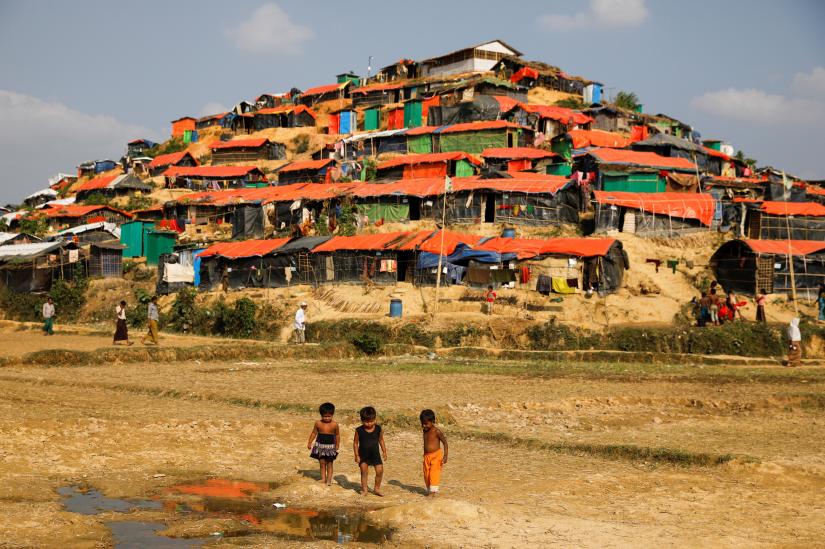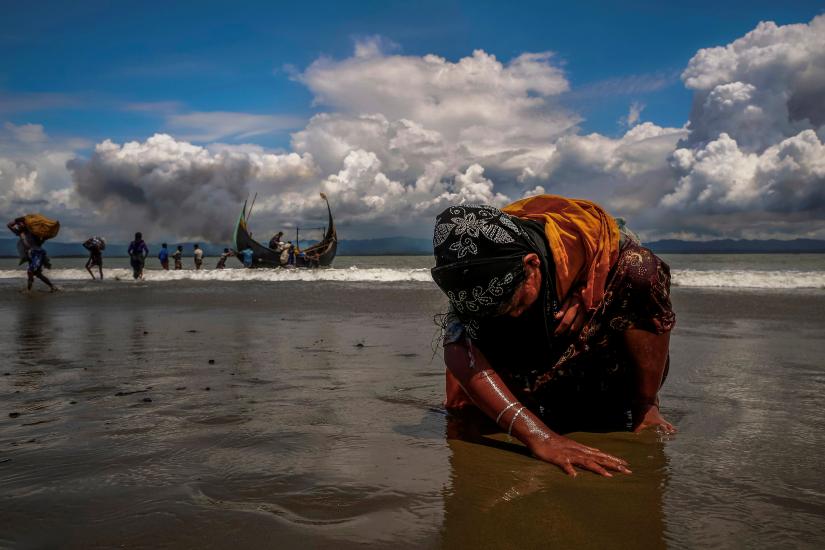 Before August 2017, Bangladesh was sheltering less than half million Rohingyas in camps at Cox’s Bazar, but after the military crackdown some 700,000 fled Rakhine soaring the number to over 1.1 million.
Before August 2017, Bangladesh was sheltering less than half million Rohingyas in camps at Cox’s Bazar, but after the military crackdown some 700,000 fled Rakhine soaring the number to over 1.1 million.
Despite joint efforts by Myanmar and Bangladesh, Rohingyas refuse to go back to their homeland under the present condition.
There was a move for repatriation in November, but due to absence of conducive environment and lack of safety and security, not a single family agreed to return.
In this backdrop, the government is pushing for strengthening its Rohingya diplomacy in bilateral, regional and multilateral spheres and efforts to ensure accountability for the atrocities that was committed by Myanmar military.
Foreign Secretary M Shahidul Haque told Bangla Tribune, “It’s an overarching issue and whenever we get an opportunity, we discuss it in bilateral or multilateral platforms.”
It is not a problem between Bangladesh and Myanmar, rather it is an internal affairs of the neighbouring country and we believe that it started in Myanmar and it has to resolve there, he said.
“We are victim of the crisis and we are trying in whatever possible way to resolve it in bilateral, regional and multilateral arenas,” he said.
Bilateral engagement
From the very beginning of the crisis and still now, Dhaka has been trying to resolve the crisis in a peaceful manner. Dhaka remained calm even after repeated provocation by the Myanmar military as their planes and helicopters illegally entered Bangladesh territory on several occasions.
Prime Minister Sheikh Hasina has taken a firm decision not to apply any force and even before the 2017 crisis started, she wrote letter to Myanmar authorities to start a bilateral negotiation.
Eventually there was an agreement on the repatriation signed in Naypyitaw on November 23, 2017 and a joint working group was formed under it for smooth repatriation.
Since then two such meetings were held and the third one is expected to be held in later part of April when Bangladesh is likely to propose something new.
“As far our understanding goes, the current initiative and pace are not enough for quick repatriation of Rohingyas,” said an official who deals with the issue.
We need to give it a strong push to expedite the process, he said adding, “We are consulting with other stakeholders how we can move forward.”
Bangladesh wants a sustainable repatriation so that Rohingyas don’t come back again and for that their rights need to be ensured, he said.
We want implementation of November agreement so that they can live in Rakhine safely and have a decent livelihood with basic human rights, he said.
“It happened in 1978 and again in 1992 and we don’t want to see it happen one more time.”
Regional engagement
Bangladesh is engaged with all regional powers including China and India for amicable solution of the crisis.
Recently Foreign Minister AK Abdul Momen visited India and discussed Rohingya issue with the Indian authorities. On several occasions, Chinese Special Envoy Sun Guoxiang visited Dhaka and discussed how it can be resolved.
An official said, both the countries have their own national interest and also interest in Myanmar and in that perspective, they showed solidarity with Bangladesh.
Everybody agrees that Rohingyas should go back to Myanmar, their homeland, but dispute arises on what conditions and terms, he said.
China on several occasions requested Bangladesh not to internationalise the issue and resolve it bilaterally but it is difficult for Dhaka to accept on the ground that unless there is a consistent pressure from the international community, there is a very slim possibility of sustainable repatriation, he said.
“We repeatedly request them to influence Myanmar for repatriation and got their assurance about it,” he added.
About India, he said, the neighbouring country is supportive to Bangladesh but it does not throw its weight behind the cause the way Dhaka wants.
“We requested them to accommodate our concern so that they become more vocal about the issue,” he added.
Bangladesh is also engaged with Asean bloc, where Myanmar is also a member, said another official. US and Europe
US and Europe
The Western countries are supportive to Bangladesh politically and providing generous humanitarian assistance, but there is a divergence view between Dhaka and them about the future of Rohingyas.
There is an intention of the Western countries to invest in Rohingyas here to create human resources whereas Dhaka wants them to invest in Rakhine so that when the Rohingyas go back they will have decent life.
“All of us want about safe and dignified repatriation of Rohingyas but on some issues we have different views and we negotiate and discuss to find best possible compromised ways,” said an official.
Dhaka gets strong political support from them and they are consistently putting pressure on Myanmar for repatriation which will help resolve the crisis, he added.
Washington is helping Dhaka in the United Nations Security Council where a behind the scene negotiation is going on about a resolution, the official said.
However, Bangladesh is disturbed by third-country relocation propaganda that was spread by some Western media, said another official.
Citing example, he said, last November when Bangladesh was trying for repatriation, a Western media published a report that Dhaka was unwilling to send a limited number of Rohingyas to Canada.
“The fact is there was a verbal inquiry from Canada about possible family reunion of less than 10 Rohingyas who are now currently living in Bangladesh,” he said.
But, they made it a huge issue and wrote about 800-word story without disclosing the fact, he added.
 National
National
41392 hour(s) 39 minute(s) ago ;
Morning 11:33 ; Monday ; Jul 07, 2025
Dhaka boosts efforts to resolve Rohingya crisis
Send
Sheikh Shahariar Zaman
Published : 06:00, Apr 01, 2019 | Updated : 06:00, Apr 01, 2019
Published : 06:00, Apr 01, 2019 | Updated : 06:00, Apr 01, 2019
0 ...0 ...
/hb/
Topics: Top Stories
- KOICA donates medical supplies to BSMMU
- 5 more flights to take back British nationals to London
- Covid19: Rajarbagh, Mohammadpur worst affected
- Momen joins UN solidarity song over COVID-19 combat
- Covid-19: OIC to hold special meeting
- WFP begins food distribution in Cox’s Bazar
- WFP begins food distribution in Cox’s Bazar
- 290 return home to Australia
- Third charter flight for US citizens to return home
- Dhaka proposes to postpone D8 Summit
Unauthorized use of news, image, information, etc published by Bangla Tribune is punishable by copyright law. Appropriate legal steps will be taken by the management against any person or body that infringes those laws.
Bangla Tribune is one of the most revered online newspapers in Bangladesh, due to its reputation of neutral coverage and incisive analysis.
F R Tower, 8/C Panthapath, Shukrabad, Dhaka-1207 | Phone: 58151324; 58151326, Fax: 58151329 | Mob: 01730794527, 01730794528


